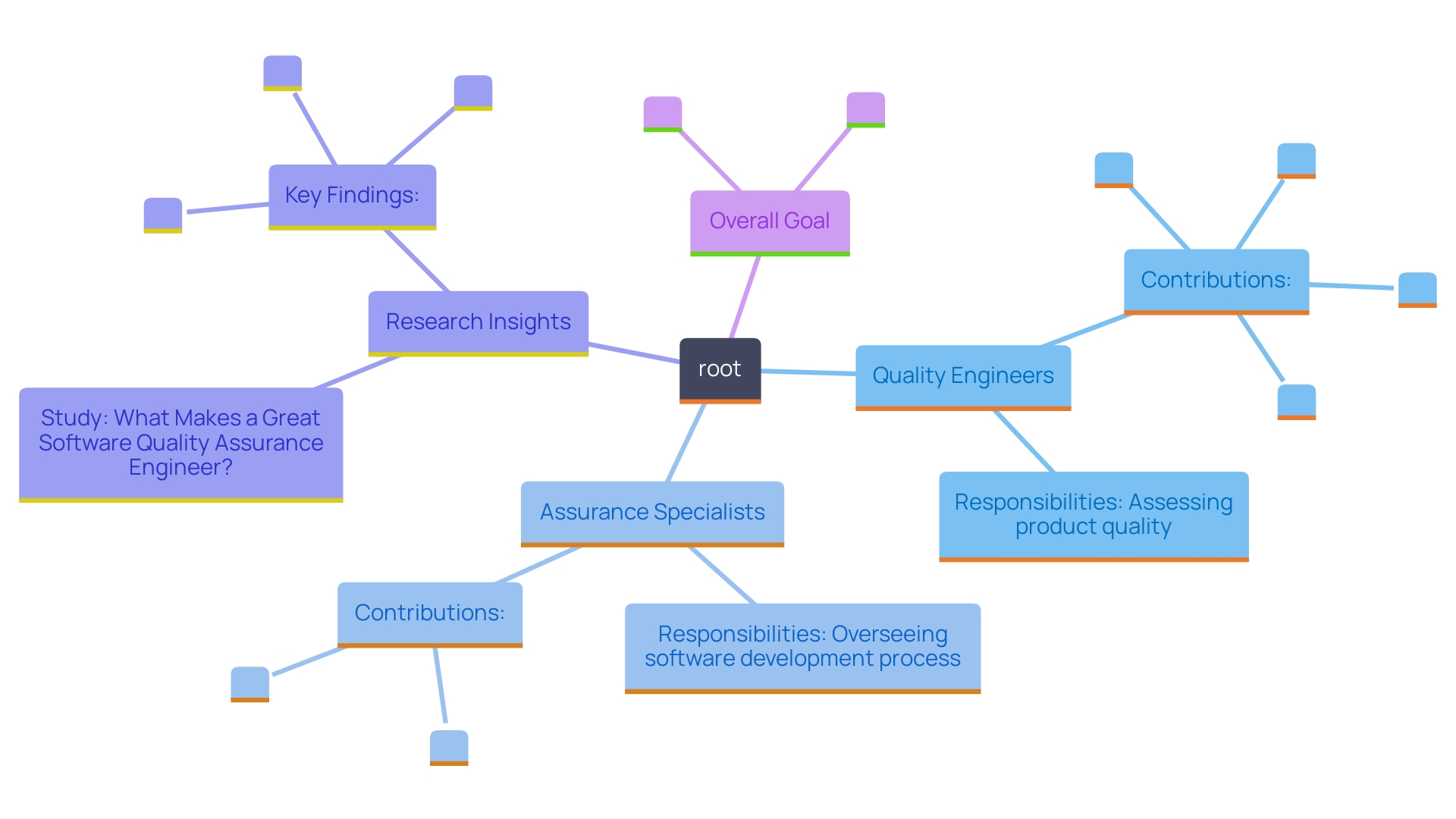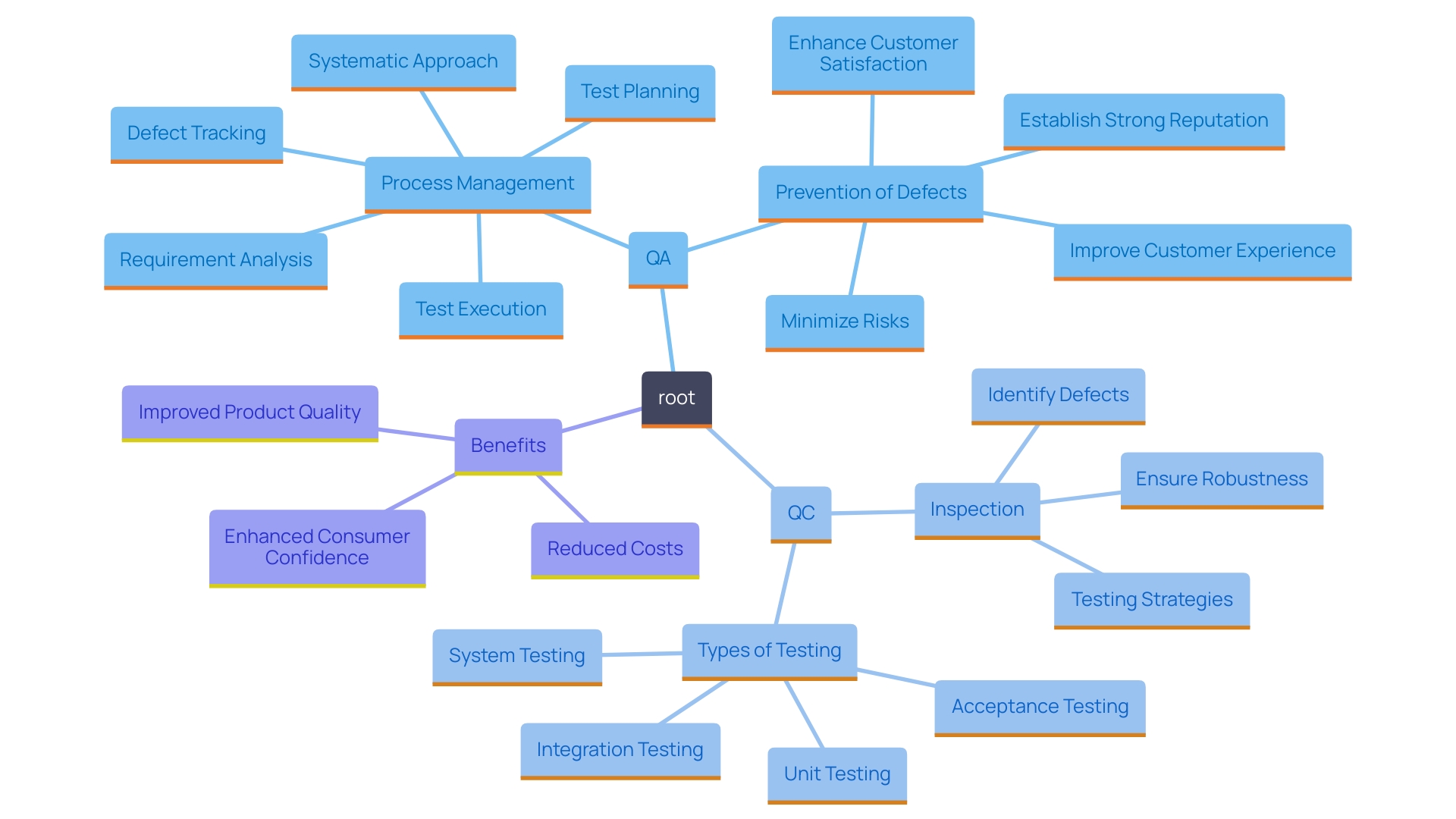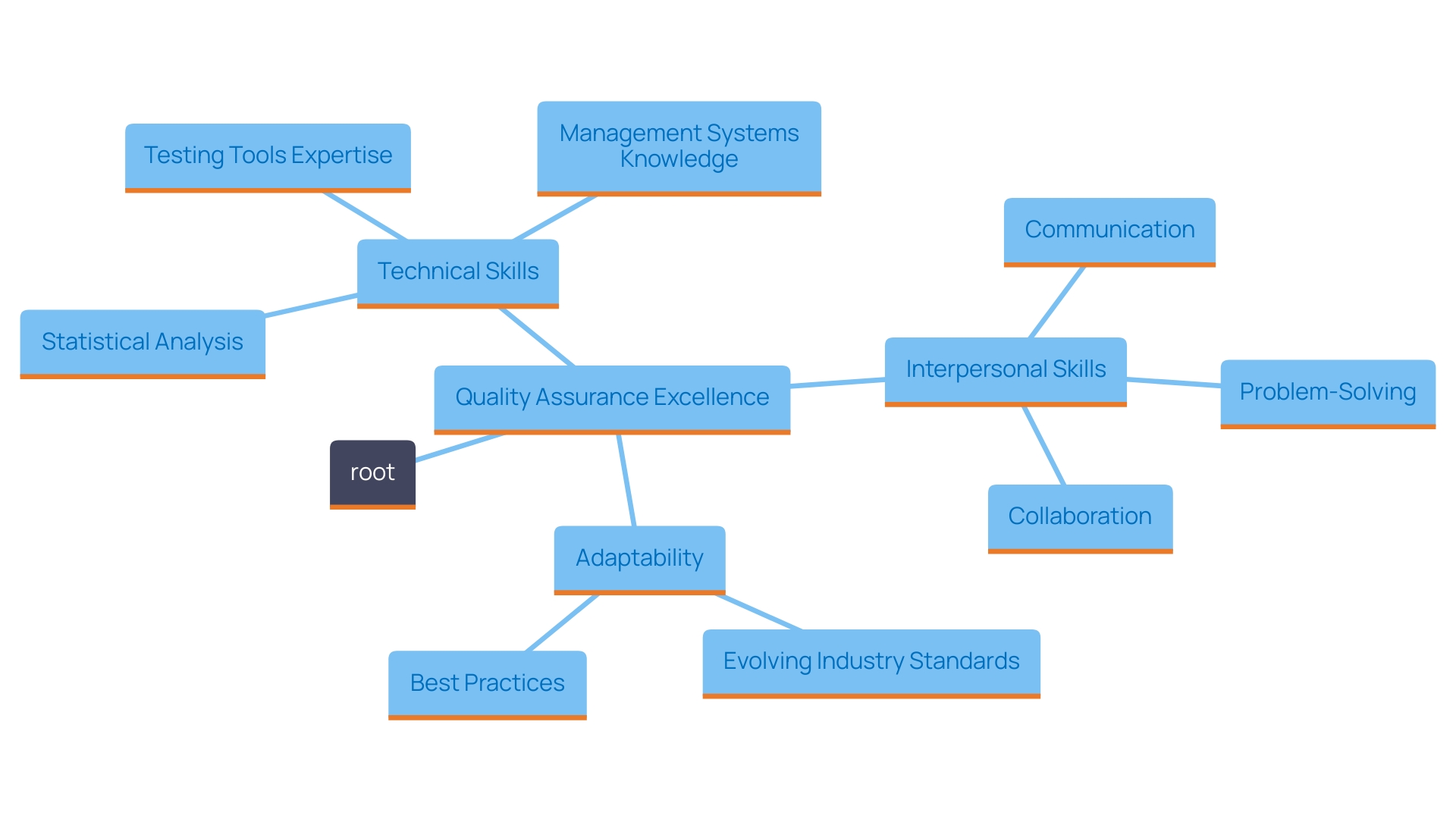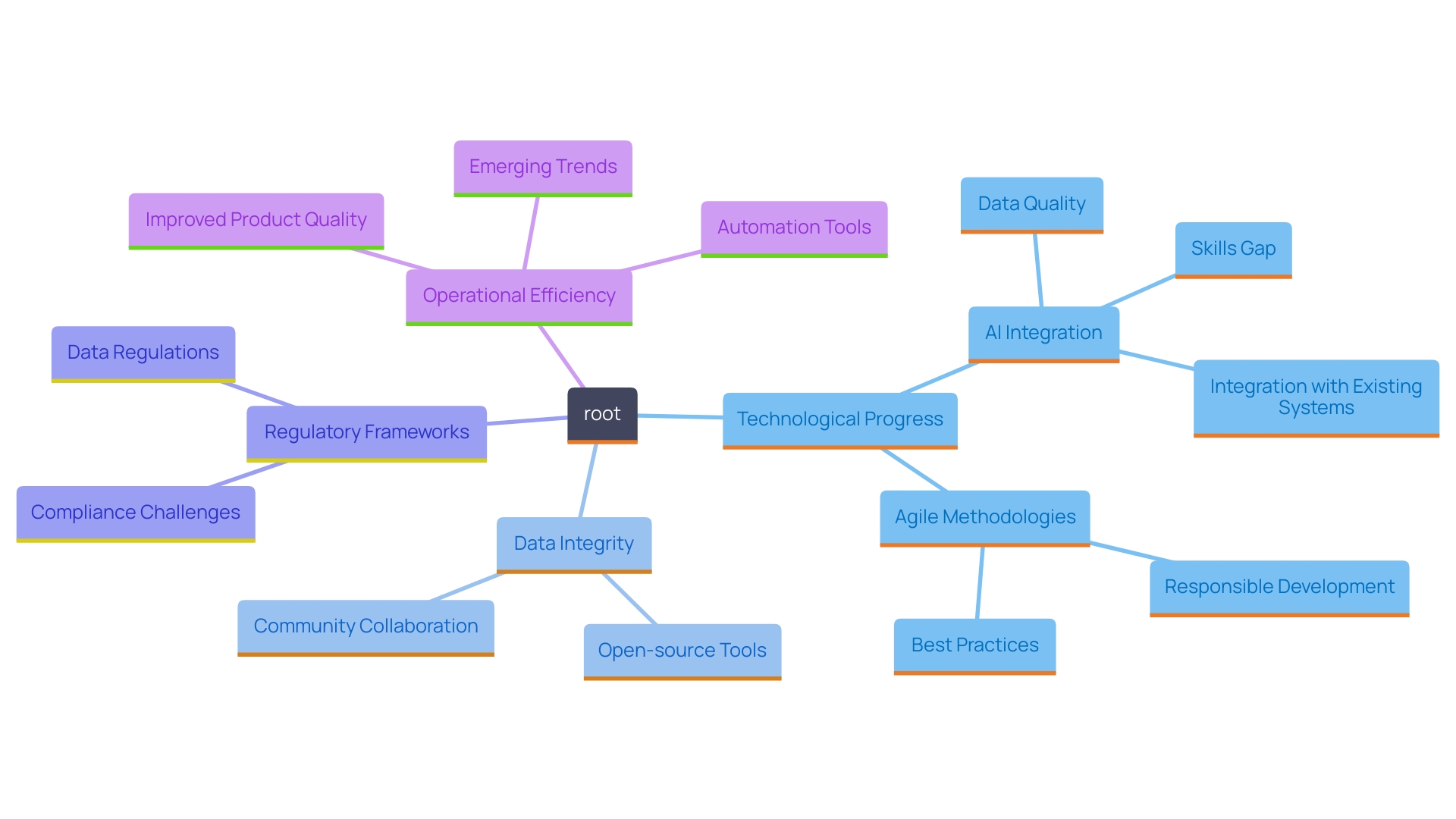Introduction
In the dynamic landscape of product development, the role of Quality Engineers has never been more critical. As guardians of excellence, these professionals are tasked with ensuring that products not only meet rigorous standards but also align with customer expectations. Their responsibilities extend beyond mere inspections; they are integral to developing and implementing comprehensive quality assurance processes that identify defects and drive corrective actions throughout the product lifecycle.
By collaborating closely with development teams, Quality Engineers embed quality considerations into every stage of production, from initial design through to final deployment.
The significance of Quality Engineering is further underscored by recent trends that highlight the increasing importance of software quality in the modern development lifecycle. Companies are now seeking skilled professionals who can navigate the complexities of quality management, ensuring that customer satisfaction remains at the forefront of their efforts. This article delves into the key roles and responsibilities of Quality Engineers, explores the vital distinctions between quality assurance and quality control, and examines the essential skills required to thrive in this ever-evolving field.
Additionally, it addresses the challenges and opportunities that define the contemporary landscape of Quality Engineering, providing a comprehensive overview of a profession that is pivotal to business success.
Key Roles and Responsibilities of Quality Engineers
Specialists in excellence are crucial for guaranteeing that items not only fulfill set criteria but also correspond with client anticipations. Their role includes the development and execution of thorough assurance processes, which are essential in identifying flaws and enabling corrective measures throughout the lifecycle of the item. By closely working together with development teams, assurance specialists ensure that standards are integrated at every phase of product creation, from initial design to final deployment.
Furthermore, Quality Engineers are responsible for creating and maintaining essential documentation that outlines standards and practices. This documentation acts as a reference point for all stakeholders involved, fostering a culture of excellence throughout the organization. Along with these duties, they frequently hold training sessions focused on informing team members about optimal practices. Such initiatives are crucial in fostering a shared understanding of excellence objectives and methodologies among various departments.
'The significance of these roles has been underscored in recent research, including the results from the World Performance Report, which stresses the growing emphasis on software excellence in the development lifecycle.'. It states that "as software performance aspects have become more of a priority in the life cycle of software development, employers seek professionals that best suit the company's objectives." This change demonstrates the increasing demand for proficient specialists who can maneuver through the intricacies of contemporary development settings.
In essence, Excellence Engineers are not merely inspectors; they are proactive contributors who shape the processes that ensure product superiority, thereby enhancing customer satisfaction and driving business success.

Quality Assurance and Quality Control in Quality Engineering
Quality Assurance (QA) and Quality Control (QC) represent pivotal elements in the realm of Quality Engineering, each serving distinct yet complementary functions. QA is fundamentally concerned with the processes that ensure excellent output, focusing on the prevention of defects through systematic process management and enhancement. 'This proactive approach not only streamlines operations but also fosters a culture of continuous improvement, thereby aligning with contemporary management principles that emphasize the importance of metrics and feedback loops.'.
Conversely, QC is centered on the actual activities and techniques deployed to meet quality requirements. This includes rigorous inspections and testing of items to identify defects before they reach the market. The operational integrity of QC is paramount, as it directly influences customer satisfaction by ensuring that only high-quality items are delivered.
Engineers skilled in their field effectively combine both QA and QC methods, establishing a comprehensive structure that ensures the standard of items while also enhancing consumer confidence. As highlighted by industry experts, an effective QA process significantly reduces the risks and costs linked to product failures, ultimately enhancing user experience and solidifying a company's reputation in a competitive marketplace.
'The significance of these methodologies is emphasized in the 15-year journey of the World Standards Report, which has continuously recorded advancements and trends in engineering and testing.'. 'This report has become a crucial resource for companies aiming to refine their standards across various sectors, demonstrating that excellence in performance is not an accident but a result of informed, strategic efforts.'.

Core Skills Required for Quality Engineers
Specialists in excellence play a crucial role in guaranteeing that items meet the utmost criteria of standards and performance. To excel in this capacity, they must cultivate a diverse skill set that encompasses both technical and interpersonal abilities.
On the technical front, proficiency in statistical analysis is essential. This skill enables professionals in quality assurance to analyze data efficiently, recognize patterns, and apply enhancements. Acquaintance with management systems is just as vital, as it allows them to comply with established standards and best practices throughout the item lifecycle. Additionally, expertise in various testing tools and methodologies is vital, as it equips them to conduct thorough assessments and ensure the reliability of software and systems.
However, technical skills alone are insufficient. Professionals in this field must also have robust interpersonal skills, including effective communication, problem-solving, and collaboration abilities. These attributes are particularly important as they frequently collaborate with cross-functional teams, integrating perspectives from different departments to enhance product excellence.
The landscape of technology is continually evolving, making continuous learning and adaptability essential traits for engineers focused on excellence. As emphasized in the 15 years of the World Quality Report, the emphasis on standards and testing has changed considerably due to evolving business dynamics and technological advancements. Organizations increasingly seek professionals who not only understand current best practices but are also adaptable to emerging trends and methodologies. This adaptability is crucial in navigating the complexities of modern software development and ensuring that offerings not only meet but exceed consumer expectations.

Challenges and Opportunities in Quality Engineering
Engineering excellence is presently maneuvering through a complicated environment characterized by swift technological progress and more elaborate item requirements. These challenges are compounded by the need to adhere to stringent regulatory frameworks, making the role of assurance specialists both critical and demanding. However, these obstacles also serve as catalysts for innovation, prompting Engineers to adopt best practices that enhance operational efficiency and product excellence.
In the realm of Quality Engineering, the exponential growth of data presents a unique set of challenges. Managing diverse data sources that vary in format and speed has become essential for informed decision-making. 'Data integrity is paramount; it directly impacts operational processes and influences the overall success of improvement initiatives.'. A robust Data Architecture is fundamental in this context, as it facilitates the systematic collection, storage, processing, and analysis of data to align with business objectives.
Moreover, traditional standards control methods have inherent limitations. For instance, manual inspection processes are often slow and cumbersome, resulting in bottlenecks that can delay production timelines. The subjective nature of human judgment may lead to inconsistencies, where defects go unnoticed due to fatigue or oversight. Thus, engineers focused on excellence are increasingly turning to agile methodologies and automation tools to streamline these processes. The integration of these technologies not only improves the precision of assessments but also enhances the overall standard of the product.
As highlighted in the 15 years of the World Quality Report, the evolution of quality testing practices over time provides valuable insights into how organizations can refine their approaches to quality management. The report's annual assessments have shed light on trends in testing tools, organizational structures, and outsourcing dynamics, which collectively inform best practices within the industry. This continuous learning and adaptation is vital for companies striving to remain competitive and ensure customer satisfaction in an ever-changing market.

Conclusion
Quality Engineers are essential in product development, ensuring that products meet high standards and align with customer expectations. Their role involves creating and implementing quality assurance processes that identify defects and facilitate corrective actions throughout the product lifecycle. By collaborating with development teams, they integrate quality considerations at every stage, enhancing overall product excellence.
The distinction between Quality Assurance and Quality Control is crucial in understanding Quality Engineering. Quality Assurance focuses on preventing defects through systematic process management, while Quality Control involves testing and inspection to ensure compliance with standards. This dual approach not only safeguards product quality but also fosters consumer trust.
As technology advances, Quality Engineers encounter challenges and opportunities. The complexities of modern product demands and regulatory requirements require the adoption of agile methodologies and automation tools, which streamline quality assessments and improve product quality. Continuous learning and adaptability are vital in this ever-changing landscape.
In summary, the expertise of Quality Engineers is key to driving product excellence and customer satisfaction. Their blend of technical and interpersonal skills, along with a proactive quality management approach, positions them as critical contributors to organizational success. As businesses increasingly prioritize quality, the importance of Quality Engineers will continue to rise, solidifying their role as guardians of excellence in product development.




